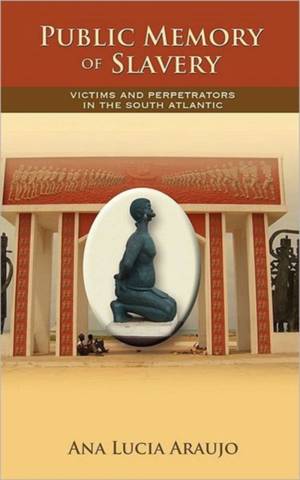
Je cadeautjes zeker op tijd in huis hebben voor de feestdagen? Kom langs in onze winkels en vind het perfecte geschenk!
- Afhalen na 1 uur in een winkel met voorraad
- Gratis thuislevering in België vanaf € 30
- Ruim aanbod met 7 miljoen producten
Je cadeautjes zeker op tijd in huis hebben voor de feestdagen? Kom langs in onze winkels en vind het perfecte geschenk!
- Afhalen na 1 uur in een winkel met voorraad
- Gratis thuislevering in België vanaf € 30
- Ruim aanbod met 7 miljoen producten
Zoeken
Public Memory of Slavery
Victims and Perpetrators in the South Atlantic
Ana Lucia Araujo
Hardcover | Engels
€ 183,45
+ 366 punten
Omschrijving
In this book, Ana Lucia Araujo argues that despite the rupture provoked by the Atlantic slave trade, the Atlantic Ocean was never a physical barrier that prevented the exchanges between the two sides; it was instead a corridor that allowed the production of continuous relations. Araujo shows that the memorialization of slavery in Brazil and Benin was not only the result of survivals from the period of the Atlantic slave trade but also the outcome of a transnational movement that was accompanied by the continuous intervention of institutions and individuals who promoted the relations between Brazil and Benin. Araujo insists that the circulation of images was, and still is, crucial to the development of reciprocal cultural, religious, and economic exchanges and to defining what is African in Brazil and what is Brazilian in Africa. In this context, the South Atlantic is conceived as a large zone in which the populations of African descent undertake exchanges and modulate identities, a zone where the European and the Amerindian identities were also appropriated in order to build its own nature. This book shows that the public memory of slavery and the Atlantic slave trade in the South Atlantic is plural; it is conveyed not only by the descendants of the victims but also by the descendants of perpetrators. Although the slave past is a critical issue in societies that largely relied on slave labor and where the heritage of slavery is still present, the memories of this past remain very often restricted to the private space. This book shows how in Brazil and Benin social actors appropriated the slave past to build new identities, fight against social injustice, and in some cases obtain political prestige. The book illuminates how the public memory of slavery in Brazil and Benin contributes to the rise of the South Atlantic as an autonomous zone of claim for recognition for those peoples and cultures that were cruelly broken, dispersed, and depreciated by the Atlantic slave trade. Public Memory of Slavery is an important book for collections in slavery studies, memory studies, Brazilian and Latin American studies, ethnic studies, cultural anthropology, African studies and African Diaspora. Araujo sheds light on the paradoxical understandings of the slave trade in southern Benin and the unintended results of some international efforts to recognise the history of slavery and the slave trade. [...] makes a useful addition to the literature because the reader is only reminded how much Africans and descen- dants of Africans have shaped this vast Atlantic world territory through divergent processes of exchange and recreation, occurring both within and beyond the gaze of Western dis- course. (Itinerario, November 2011) The book is broad ranging and provides an introduction to numerous subjects (...) Recommended. (Choice, June 2011)
Specificaties
Betrokkenen
- Auteur(s):
- Uitgeverij:
Inhoud
- Aantal bladzijden:
- 502
- Taal:
- Engels
Eigenschappen
- Productcode (EAN):
- 9781604977141
- Verschijningsdatum:
- 28/07/2010
- Uitvoering:
- Hardcover
- Formaat:
- Genaaid
- Afmetingen:
- 152 mm x 229 mm
- Gewicht:
- 902 g

Alleen bij Standaard Boekhandel
+ 366 punten op je klantenkaart van Standaard Boekhandel
Beoordelingen
We publiceren alleen reviews die voldoen aan de voorwaarden voor reviews. Bekijk onze voorwaarden voor reviews.









